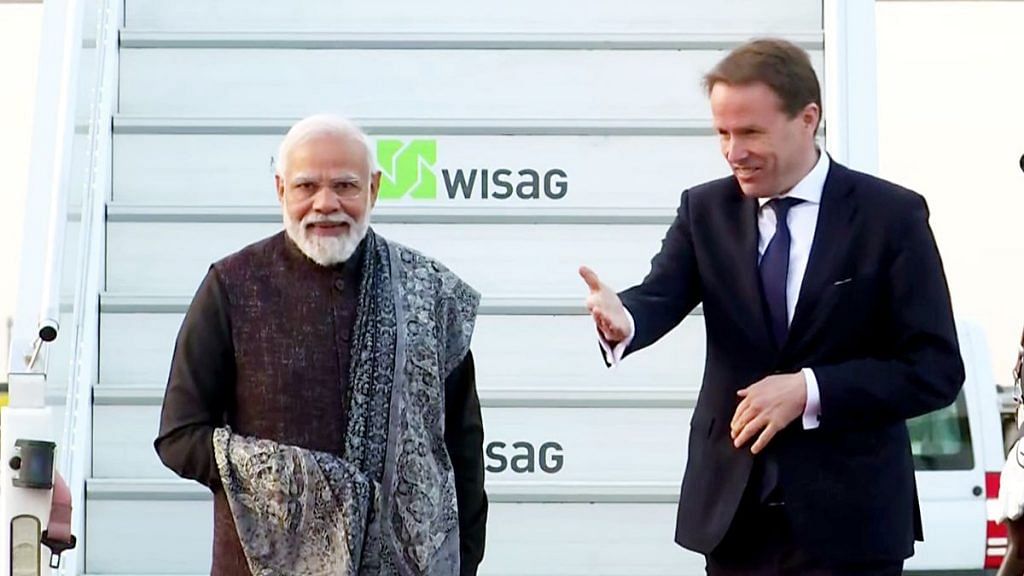Prime Minister Narendra Modi is in Germany as part of a three-nation tour to Europe, and it is expected that he and German chancellor Olaf Schulz will have a free, frank and sombre, conversation about the changing international mood led by the Russian invasion of Ukraine.
The Modi government’s deliberately studied, centrist position of neutrality over the Russian invasion has held it in good stead these past two months. It has not only been able to withstand US-led pressure but has pointed out that America as well as its Western allies, like Germany, are buying more fossil fuel from Russia than India has in recent weeks, despite discounted prices.
Certainly, Germany is on top of the energy intake chart from Russia. According to the Finland-based Centre for Research on Energy and Clean Air, Europe is financing Vladimir Putin’s war in Ukraine these past weeks – Germany is the worst offender (spent 9.1 billion euros), followed by Italy (spent 6.9 billion euros), while China comes a close third (6.7 billion euros).
And because Germany has been coming under considerable pressure from the US and the rest of Europe to reduce that dependency, perhaps one thread of Modi’s conversation with Scholz would be to gently suggest that there’s no real need for either guilt or remorse, because national interest must always supersede the moral high ground adopted by third parties.
Germany’s recently elected Social Democratic Party (SDP) government knows that the last thing it wants on its hands is an economic crisis that has been exacerbated by hasty decisions on the energy front.
This guilt being forced on India and Germany, both regional powers, by their friends and allies, is what makes Modi’s visit to Berlin so interesting. The point here is that neither New Delhi nor Berlin should succumb to what others believe is better for them.
Also Read: Is France our ‘new Russia’ – What Macron’s re-election means for India
India and Germany’s national interest
It’s high time that the rest of the world stops infantilising both India and Germany – the two governments are quite capable of protecting their respective national interest.
Both have good, strong friendships with Russia. Both believe— at least India does, privately—that Russia had no business invading Ukraine and violating the territorial integrity of another sovereign nation. Prime Minister Modi unequivocally told Russian foreign minister Sergey Lavrov during his visit that Russia should find a way of stopping the war and beginning peace talks.
The big difference, of course, is in their public handling of the crisis. While Germany has been a strong supporter of the US-led punishment of Russia, India has remained far more neutral, refusing to add its voice to the general condemnation.
Certainly, like India, Germany also has a special relationship with Russia. It has often disagreed with the rest of Europe in maintaining a strong tie with Moscow; Berlin knows that if it were not for the Soviet Union in 1989, informally guaranteeing the reunification of its country, Berlin would still be a divided city, just like the country. As a close neighbour, Germany understands Russia’s stakes in investing in a stable Europe.
That’s why Chancellor Scholz backed his predecessor Angela Merkel in pushing back US efforts last year to sanction the Nordstream gas pipeline from Russia; the SDP, for some time, has advocated energy cooperation with Moscow as a means of bringing Russia into its fold.
According to Claudia Kemfert at the German Institute for Economic Research, the SDP’s recent determination to generate electricity only from renewable sources 2035 onwards is very welcome – especially because the share of Russian natural gas today constitutes 35 per cent of Germany’s total energy imports.
Only last year Germany paid 25 billion euros out of its total fossil fuel import bill worth 100 billion euros to Russia.
On the eve of Modi’s visit, Germany’s economy ministry said that it slashed its reliance on Russian energy imports – oil is down from 35 to 12 per cent, coal is down from 45 to 8 per cent and gas is down from 55 to 35 per cent. It promised to end coal deliveries by the end of autumn and “largely wean itself” off Russian gas by mid-2024.
But the question is, where are the alternative sources of energy going to come from?
Also Read: India is watching the Russia-Ukraine war. And Biden is watching Modi
Alternate sources of energy
US, as well as Saudi oil executives, are now saying that despite climbing oil prices, they are not likely to drill more in the short term to alleviate Europe’s crisis – especially if it is pressured to turn off the Russian tap – because they don’t know if they can sustain an oil price bust that is more than likely to follow the current boom.
Indian officials who spoke on the condition of anonymity said they are also asking their Western counterparts to help reopen the spigot from Iran if India is to stop buying from Russia altogether.
“You cannot sanction Iran and Venezuela and Russia’s oil, all at the same,” the official said. Moreover, they added, the diversification of Indian defence purchases away from Russia, is also expected to take some time.
Modi’s short stopover in France on the return journey home from Berlin and Copenhagen—where he will participate in the second Nordic summit, some of whom are NATO members, like Norway, and some want to become soon, like Sweden—will be an opportunity to exchange views with the newly reelected French president Emmanuel Macron.
Certainly, the PM’s short trip to Europe is timely. The world is changing, India must take note of the change so that it can prepare for the challenges in the coming years and reorient its own foreign policy direction.
Jyoti Malhotra is a senior consulting editor at ThePrint. She tweets @jomalhotra. Views are personal.
(Edited by Srinjoy Dey)
